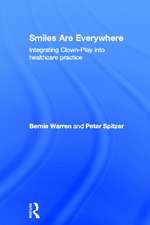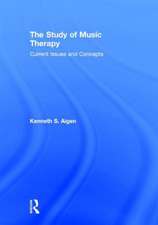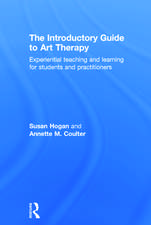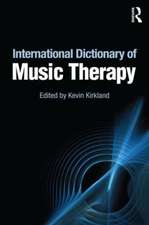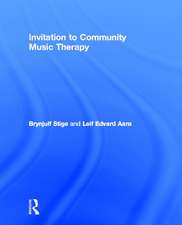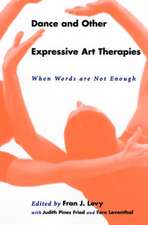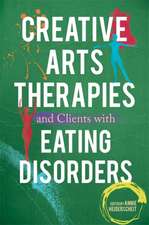Singing and Wellbeing: Ancient Wisdom, Modern Proof
Autor Kay Nortonen Limba Engleză Paperback – 3 aug 2015
| Toate formatele și edițiile | Preț | Express |
|---|---|---|
| Paperback (1) | 397.88 lei 6-8 săpt. | |
| Taylor & Francis – 3 aug 2015 | 397.88 lei 6-8 săpt. | |
| Hardback (1) | 1019.30 lei 6-8 săpt. | |
| Taylor & Francis – 23 iul 2015 | 1019.30 lei 6-8 săpt. |
Preț: 397.88 lei
Nou
Puncte Express: 597
Preț estimativ în valută:
76.17€ • 79.48$ • 63.85£
76.17€ • 79.48$ • 63.85£
Carte tipărită la comandă
Livrare economică 13-27 martie
Preluare comenzi: 021 569.72.76
Specificații
ISBN-13: 9781138825321
ISBN-10: 1138825328
Pagini: 226
Ilustrații: 5 black & white halftones, 21 black & white line drawings
Dimensiuni: 152 x 229 x 13 mm
Greutate: 0.34 kg
Ediția:1
Editura: Taylor & Francis
Colecția Routledge
Locul publicării:Oxford, United Kingdom
ISBN-10: 1138825328
Pagini: 226
Ilustrații: 5 black & white halftones, 21 black & white line drawings
Dimensiuni: 152 x 229 x 13 mm
Greutate: 0.34 kg
Ediția:1
Editura: Taylor & Francis
Colecția Routledge
Locul publicării:Oxford, United Kingdom
Cuprins
Part I. Singing in History, Cognition, and Parenting 1. The First Musical Instrument 2. Neural Mapping and Brain Chemistry: How Singing is Good for You 3. "Womb to Tomb": Singing, Science, and the Mother's Voice Part II. Singing for the Group, the Self, and the Soul 4. Singing Our Songs: Damon of Athens, the Blues, and Group Psychology 5. The Loss of Brain Function: How Singing Helps 6. Singing and Religion Timeline: Selected Timeline of Vocal Healing Milestones from Mythology and History
Notă biografică
Kay Norton is Associate Professor of Musicology at Arizona State University.
Recenzii
"A brilliantly thorough thesis on the topic of singing’s existential essence and its elemental presence in well-being. Kay Norton’s compelling research shows a deeply engaged scholar ably traversing cross-cultural and cross-disciplinary perspectives in search of answers to the question of how and why singing affects us so profoundly."
—Sarah Schmalenberger, Associate Professor of Music, University of St. Thomas
"Kay Norton’s stimulating book draws on both scientific and humanistic disciplines to explain why humans sing and the effects this has on their nature, culture, and wellbeing. With its emphasis on the promotion of health through song it is set to become essential reading for anyone interested in this topic."
—Penelope Gouk, Honorary Research Fellow, University of Manchester
"From the womb to the deathbed, the voice offers a sense of self and of one’s place within community. Keeping the singing voice at the center, Singing and Wellbeing: Ancient Wisdom, Modern Proof is diagnostic, prescriptive, historically grounded, philosophically attuned, and beautifully pitched."
—Nina Eidsheim, Assistant Professor of Musicology, University of California, Los Angeles
"Synthesizing research findings from neuroscience, historical musicology, ethnomusicology, music therapy, anthropology, aesthetics, theology, and other fields, Norton skilfully weaves a rich tapestry that provides compelling evidence for the pervasive role of singing in human societies.... Norton’s multi-faceted discussion of singing joyfully illuminates and reflects the multiple roles that the melodious-inflected voice occupies in the human experience."
—William A. Everett, Curators' Distinguished Professor of Musicology, Univeristy of Missouri-Kansas City, IRASM vol.47 no.1
"Kay Norton’s Singing and Wellbeing: Ancient Wisdom, Modern Proof offers a thought-provoking case for allowing our musical attentions to divert, or at least become more holistic, toward the ‘nonmusical benefits’ of singing. Norton takes the reader on a multi-disciplinary journey through ‘serious study’ in fields such as the neurosciences and medicine on the health and wellness benefits of singing. … Readers will recognize there is much more we as musicians can and should be learning about the connections between singing and lifelong health."
— William F. Tell, Choral Journal
"Overall, I found this book very easy to read and full of useful information to support my practice. The historical origins of individual and group singing practices, alongside recent research and case studies have not previously been encapsulated in such detail. I have already found myself using some of my furthered knowledge about singing and the brain in conversations with parents and carers, sharing with them some of the processes taking place which make singing so beneficial. I liked the way that there was significant attention given to both verbal and non-verbal aspects of the voice, acknowledging from the outset the importance of what she terms the ‘inflected voice’ in bringing meaning to vocal exchanges. The author has covered an extensive amount of literature and the reference sections are full of useful further reading for those wishing to delve deeper."
—Tina Warnock, British Journal of Music Therapy
"Recommended"
— R. D. Arcari, University of Connecticut School of Medicine in CHOICE
—Sarah Schmalenberger, Associate Professor of Music, University of St. Thomas
"Kay Norton’s stimulating book draws on both scientific and humanistic disciplines to explain why humans sing and the effects this has on their nature, culture, and wellbeing. With its emphasis on the promotion of health through song it is set to become essential reading for anyone interested in this topic."
—Penelope Gouk, Honorary Research Fellow, University of Manchester
"From the womb to the deathbed, the voice offers a sense of self and of one’s place within community. Keeping the singing voice at the center, Singing and Wellbeing: Ancient Wisdom, Modern Proof is diagnostic, prescriptive, historically grounded, philosophically attuned, and beautifully pitched."
—Nina Eidsheim, Assistant Professor of Musicology, University of California, Los Angeles
"Synthesizing research findings from neuroscience, historical musicology, ethnomusicology, music therapy, anthropology, aesthetics, theology, and other fields, Norton skilfully weaves a rich tapestry that provides compelling evidence for the pervasive role of singing in human societies.... Norton’s multi-faceted discussion of singing joyfully illuminates and reflects the multiple roles that the melodious-inflected voice occupies in the human experience."
—William A. Everett, Curators' Distinguished Professor of Musicology, Univeristy of Missouri-Kansas City, IRASM vol.47 no.1
"Kay Norton’s Singing and Wellbeing: Ancient Wisdom, Modern Proof offers a thought-provoking case for allowing our musical attentions to divert, or at least become more holistic, toward the ‘nonmusical benefits’ of singing. Norton takes the reader on a multi-disciplinary journey through ‘serious study’ in fields such as the neurosciences and medicine on the health and wellness benefits of singing. … Readers will recognize there is much more we as musicians can and should be learning about the connections between singing and lifelong health."
— William F. Tell, Choral Journal
"Overall, I found this book very easy to read and full of useful information to support my practice. The historical origins of individual and group singing practices, alongside recent research and case studies have not previously been encapsulated in such detail. I have already found myself using some of my furthered knowledge about singing and the brain in conversations with parents and carers, sharing with them some of the processes taking place which make singing so beneficial. I liked the way that there was significant attention given to both verbal and non-verbal aspects of the voice, acknowledging from the outset the importance of what she terms the ‘inflected voice’ in bringing meaning to vocal exchanges. The author has covered an extensive amount of literature and the reference sections are full of useful further reading for those wishing to delve deeper."
—Tina Warnock, British Journal of Music Therapy
"Recommended"
— R. D. Arcari, University of Connecticut School of Medicine in CHOICE
Descriere
Singing and Wellbeing provides evidence that the benefits of a melodious voice go far beyond pleasure, and confirms the importance of singing in optimum health. A largely untapped resource in the health care professions, the singing voice offers rewards that are closer than ever to being fully quantified by advances in neuroscience and psychology. For music, pre-med, bioethics, and medical humanities students, this book introduces the types of ongoing research that connect behaviour and brain function with the musical voice.



